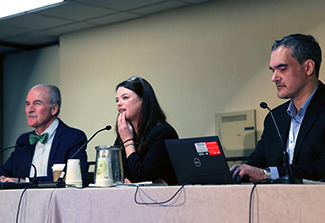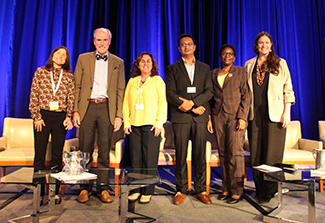Fogarty’s impact on display at CUGH 2024
March/April 2024 | Volume 23 Number 2
 Fogarty International CenterFrom left: Acting Fogarty Director Peter Kilmarx, Acting Deputy Director Rachel Sturke, and Communications Director Andrey Kuzmichev listen to questions from the audience during the Fogarty Listening Session at CUGH 2024
Fogarty International CenterFrom left: Acting Fogarty Director Peter Kilmarx, Acting Deputy Director Rachel Sturke, and Communications Director Andrey Kuzmichev listen to questions from the audience during the Fogarty Listening Session at CUGH 2024
The 15th annual Consortium of Universities for Global Health (CUGH) conference was held March 7–10, 2024, in Los Angeles, California. The conference theme was "Global Health Without Borders: Acting for Impact."
Fogarty’s first listening session
Fogarty hosted its first-ever listening session at CUGH 2024, led by Acting Director Dr. Peter Kilmarx, Acting Deputy Director Dr. Rachel Sturke, and Communications Director Dr. Andrey Kuzmichev. The goal of the session was to gather thoughts and suggestions about global health at NIH going forward. It was also a chance to help Fogarty begin putting together a new strategic plan; the last one was written a decade ago.
Some important topics raised by the group included prioritizing research infrastructure for the health workforce, advocating for research partners in in low- and middle-income countries (LMICs), and navigating research in conflict zones.
Creating equitable partnerships in global health
In a plenary session centered around how the global health community can work together to balance the playing field between higher- and lower-income countries in all aspects of research, Kilmarx alongside
Dr. Patricia García, multiple Fogarty grant recipient and professor at the School of Public Health and Administration at the Universidad Peruana Cayetano Heredia in Peru, Dr. Bethany Hedt-Gauthier, associate professor of global health and social medicine at Harvard University and current Fogarty mHealth grant recipient, Dr. Biraj Karmacharya, director of public health/community programs and global engagement at Dhulikhel Hospital-Kathmandu University in Nepal, and Dr. Elsie Kiguli-Malwadde, president of the Fogarty-supported
African Association for Health Professions Education and Research (AFREHealth), discussed a broad range of topics including increasing the flow of financial resources to the Global South, restructuring research based on local priorities, elevating the needs of educational institutions in lower-income countries, and advocating for these changes among major global health donors.
 Fogarty International CenterPanelists from the “Power, Resources, and Equitable Partnerships” plenary session at CUGH 2024. From left: Carey Farquhar, Peter Kilmarx, Patty García, Biraj Karmachary, Elsie Kiguli-Malwadde, and Bethany Hedt-Gauthier.
Fogarty International CenterPanelists from the “Power, Resources, and Equitable Partnerships” plenary session at CUGH 2024. From left: Carey Farquhar, Peter Kilmarx, Patty García, Biraj Karmachary, Elsie Kiguli-Malwadde, and Bethany Hedt-Gauthier.
García proposed the creation of networks of researchers in LMICs that work together, similar to medical societies in the U.S. and other high-income countries. Kiguli-Malwadde agreed with this idea stating, “Networks and consortiums would allow us to reach more people, and provide opportunity outside of the bigger, elite institutions in Africa”.
Working toward WHO cervical cancer screening goals
The National Cancer Institute (NCI) hosted a session on how to integrate the WHO initiative for cervical cancer control into broader global health programs. Dr. Karla Unger-Saldana of Mexico’s National Cancer Institute discussed barriers faced by women in Mexico accessing timely diagnosis and treatment for cervical cancer due to cultural norms prioritizing family needs over their own health. She also shared how indigenous women often feel disrespected within health care settings, hindering effective care delivery. Another presenter, Dr. Hyo Sook Bae of NCI, noted similar barriers in Korea during her presentation and stated, “Patients have the right to be treated properly, nothing should be preventing them from having proper treatment and living a happy life.”
Using AI to address maternal health in low-resource settings
Hedt-Gauthier moderated a session focused on how digital technology can be used to introduce low-cost, scalable solutions to improve the quality of care around childbirth. Her team presented on their Fogarty-funded mobile health (mHealth) project, which recently won an NIH Technology Accelerator Challenge (NTAC) award and was featured in Science. The session also showcased entrepreneurs in the mHealth space including Dr. Tobi Olatunji. His AI tool,
Intron, is a speech-to-text technology which has been trained to understand more than 200 African accents and is used to create clinical documentation. Read more about Hedt-Gauthier’s project.
Studies in implementation science
Sturke also led a session about a Fogarty-supported
collection of implementation science cases focused on global health and conducted in LMICs, spanning a range of regions and disease areas. Dr. Melisa Paolino of the Center for the Study of State and Society (CEDES) in Argentina presented her assessment of the fidelity of HPV self-collection tests in low-income areas of that country. While her trial showed that screening and testing for HPV increased from 20 to 85 percent after the introduction of self-screening via community health workers, multiple changes in government administration have made it difficult to implement this strategy on a national level
LAUNCH in the spotlight
At every CUGH conference, current and former Fogarty Global Health Fellows and Scholars from the
Launching Future Leaders in Global Health Research (LAUNCH) Training Program present their work to the global health community. A group of seven program trainees shared their research insights, training experiences, and career trajectories, from treating burn injuries in Nepal to working with cancer survivors in Malawi.
In addition to the annual LAUNCH session, the
ACHIEVE consortium—part of the LAUNCH program based out of Washington University in St. Louis—held a separate session highlighting the results from three mental health studies based on dissemination and implementation frameworks led by ACHIEVE investigators.
Kilmarx commended the LAUNCH trainees, stating, “We’re so impressed by your commitment, creativity, and the diversity of the work that you're doing all over the world.”
More Information
Updated April 15, 2024
To view Adobe PDF files,
download current, free accessible plug-ins from Adobe's website.
Related Fogarty Programs
Related Global Health Research Topics